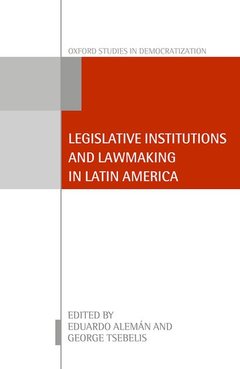Description
Legislative Institutions and Lawmaking in Latin America
Oxford Studies in Democratization Series
Coordinators: Alemán Eduardo, Tsebelis George
Language: English
Subject for Legislative Institutions and Lawmaking in Latin America:
Publication date: 06-2016
286 p. · 16x24.1 cm · Hardback
286 p. · 16x24.1 cm · Hardback
Description
/li>Biography
/li>
In this volume, twelve experts on Latin American politics investigate the ways in which the interaction between legislative institutions and the policy positions of key actors affects the initiation and passage of legislation, covering seven Latin American Countries: Argentina, Brazil, Chile, Colombia, Mexico, Peru, and Uruguay. These seven presidential systems vary widely in terms of their legislative institutions and the position of relevant actors. The introduction provides a framework to understand the interaction of legislative majorities, political institutions, and policy position, and each chapter begins with a description of the constitutional and congressional rules that allocate powers to propose, amend, and veto legislation. The authors then identify the political actors who have these prerogatives and apply the framework to show how their policy positions and relative strengths influence legislative decision-making. The findings are consistent with the basic argument of the book that presidents with extensive legislative powers may be constrained by the positions of their legislative allies, whereas weaker presidents may be well-positioned to build successful coalitions to achieve their legislative goals. The essays in this volume demonstrate that institutional design, which determines the allocation of legislative powers, must be considered along with the policy preferences of key legislative actors in order to construct a full picture of law-making. Oxford Studies in Democratization is a series for scholars and students of comparative politics and related disciplines. Volumes concentrate on the comparative study of the democratization process that accompanied the decline and termination of the cold war. The geographical focus of the series is primarily Latin America, the Caribbean, Southern and Eastern Europe, and relevant experiences in Africa and Asia. The series editor is Laurence Whitehead, Senior Research Fellow, Nuffield College, University of Oxford.
Eduardo Alemán is an Associate Professor in the Department of Political Science at the University of Houston. He specializes in the comparative analysis of political institutions and Latin American politics. His research focuses on executive-legislative relations, legislative politics, and political parties. He has published articles in such journals as World Politics, Comparative Politics, Comparative Political Studies, Legislative Studies Quarterly, and Latin American Research Review. George Tsebelis is Anatol Rapoport Collegiate Professor of Political Science at the University of Michigan. He is a comparativist who specializes in political institutions. His works covers Western European countries and the European Union. His more recent work studies political institutions in Latin America and Eastern Europe. He is the author of four books: Nested Games (University of California Press, 1991), Bicameralism (coauthored with Jeanette Money, Cambridge University Press, 1997), Veto Players (Princeton University Press, 2002), and Reforming the European Union: Realizing the Impossible (coauthored with Daniel Finke, Thomas Koenig, and Sven Oliver Proksch, Princeton University Press, 2012). His work has appeared in numerous academic journals and has been reprinted and translated in several languages.
© 2024 LAVOISIER S.A.S.
These books may interest you

Coalitional Presidentialism in Comparative PerspectiveMinority Presidents in Multiparty Systems 121.51 €

Coalitional Presidentialism in Comparative PerspectiveMinority Presidents in Multiparty Systems 38.70 €

The Politics of Legislative Debates 170.88 €

